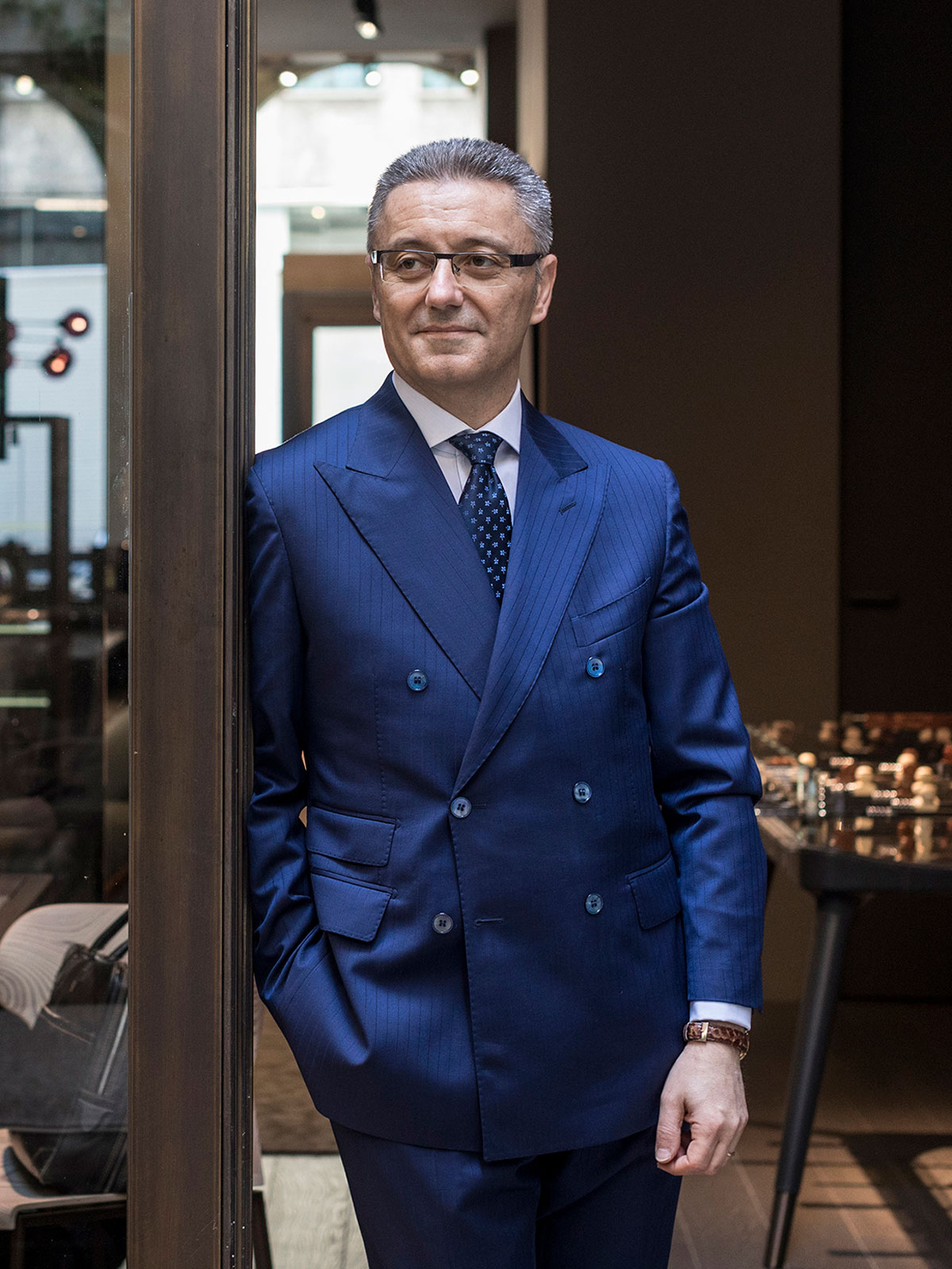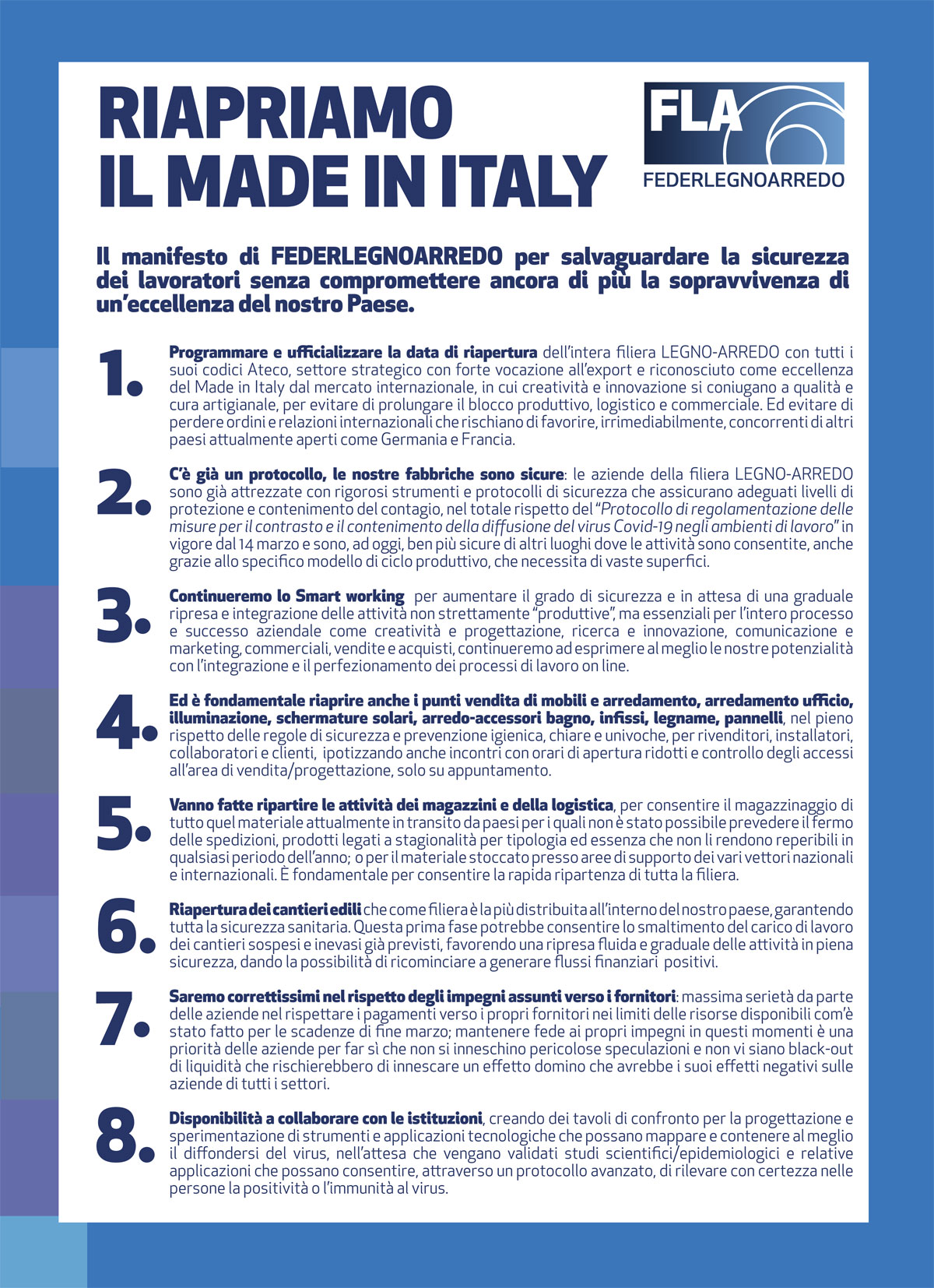Reopening to avoid regression. What is at risk is the entire industrial sector, which on its own is one of the three strategic areas of Italian production, with annual sales of about 23 billion euros. The wood-furnishings sector unites to call for resumption of production, not from 3 May – as established in the latest ministerial decree announced yesterday evening – but instead from 14 April, with reactivation of companies and factories in a gradual, controlled way, guaranteeing compliance with all the necessary measures to combat the coronavirus but also restarting a system that covers 20,000 companies and 130,000 employees.
This necessary awareness has become a true “Call to Action” on the part of a group of companies in this sector who have prepared a Design Manifesto for the initiative. B&B Italia, Bisazza, Boffi, Cappellini, Cassina, Flexform, Giorgetti, Molteni Group, Poltrona Frau have transformed a chat between a few players, not selected on the basis of membership in industrial associations, to create a dialogue on a higher level, as a response to a situation of shared necessity.

Roberto Gavazzi, CEO of Boffi
“In the first phase we have created a design round table for interaction among colleagues (rather than competitors), sharing first impressions on the results of days of halted production, and the consequences perceptible on international markets, with the aim of joining forces and conserving a direct focus on visions for the future,” says Roberto Gavazzi, CEO of Boffi.
Marco Piscitelli, Managing Director of Molteni Group, indicates with great satisfaction: “I think this opportunity for discussion has shed light on a micro-ecosystem that is not tainted by competition, but driven by the desire to implement actions for the support of the whole sector.”
This synergy has also been forcefully supported by Dario Rinero, CEO of Lifestyle Design, to bring out the needs of the entire industry and ways to protect it in physical, moral and economic terms.
“The Manifesto sets out to call the attention of the authorities to a sector that is one of the drivers of Italian exports, with a chain of supply and production that involves many employees, who together with the entrepreneurs are eager to get back to work, with the same passion and commitment as in the past – says Matteo Galimberti, CEO of Flexform. – The objective is not only to restart production, but also to provide continuity for the whole system, from manufacturers to small and large crafts workshops, all the way to our dealers and stores in Italy and abroad.”

Matteo Galimberti, CEO of Flexform

Marco Piscitelli, Managing Director of Molteni Group
An ulterior extension of the lockdown until 3 May could lead to losses of 20-30% of the Italian industrial heritage, with damage to the system and a resulting loss of tens of thousands of jobs. “Our German and northern European competitors are open for business, and are even more active at the moment, filling the temporary gap caused by our absence on crucial markets – Marco Piscitelli continues. The prolongment of the present situation puts Italian brands at a disadvantage when bidding on large contracts, and the value of Made in Italy runs the risk of being overshadowed by foreign players. The contract sector has long lead-up times, and this could threaten the carrying out of projects begun during the last 6 to 12 months by Molteni and other companies, which have all enjoyed particular trust for many years on the part of international designers.” “All this is exacerbated by the problem of contractual penalties,” says Nicola Coropulis, CEO of Poltrona Frau.
“With respect to the other companies of design and furnishings that have signed the Manifesto, we are almost ‘outsiders’ – says Rossella Bisazza, Director of Communication of Bisazza – but we have the same needs, and we address the same markets, clients and professionals: it is presently impossible for us to make deliveries to worksites already in progress, and this not only has an impact on revenues, but also brings serious damage to our image.
An opinion shared by Kurt Wallner, CEO of Cappellini: “We run the risk of losing an important portion of our business. Cappellini, like many other firms, works extensively in the contract sector, and if we have to continue to fail to guarantee production we will lose clients, who will turn to other countries. The priority is to restart production, after which we will have to restart our stores.
The theme of the retail network is also covered by the Manifesto, in the proposal of a moratorium on rents for all presently closed commercial facilities; the companies suggest reaching an agreement to reduce rental costs from April to December 2020. “We have formulated a shared policy to raise the awareness of the landlords of our stores around the world, located in the leading design districts. Boffi, like the other brands, has monobrand stores, directly owned or in partnership with clients on an international level. Hence the request for a reduction of rents in the months to come,” says Roberto Gavazzi, CEO of Boffi.
But whether the topic is stores (usually large in size, without crowds of customers, meaning that the risk of contagion from limited distancing can be kept extremely low) or factories, the common ground is an indispensable focus on safety and security in the workplace. “We took steps back at the start of the epidemic, and today we are perfectly equipped to comply with all safety protocols, availability of protective gear and measurement of temperature, sanitation of workspaces and distancing of personnel, for totally safe resumption of operations – Nicola Coropulis continues. – Our employees, who are protected by insurance provided by Lifestyle Design Group, are in agreement with this position.”
“With the goal of protecting the health and safety of all our employees, we have outfitted our factories and activated all necessary measures for an immediate return to production – says Luca Fuso, CEO of Cassina. – The restart is fundamental to conserve our position of market leadership; even a few more weeks of closure could produce enormous harm.”

Nicola Coropulis, CEO of Poltrona Frau

Giovanni del Vecchio, CEO of Giorgetti
Alongside questions of operations and economics, the Manifesto reveals another more abstract aspect, but one that is just as important: that of cooperation, of acting in a systematic, unified way, even among players who are usually in a situation of healthy competition. They are joining forces to safeguard an entire industry and all the people that are a part of it. “We are entrepreneurs who believe in the force of unity (beyond competition), and in this way we are attempting to overcome the obstacles that face us all. The project began in a spontaneous way, but it is very effective,” says Giovanni del Vecchio, CEO of Giorgetti.
“We are all members of different associations, such as FederlegnoArredo, Assarredo or Altagamma, and we have no intention of replacing them, since they exist to understand and promote the interests of their members.” The goal, in fact, is to “help our associations by creating another context of communication.” Roberto Gavazzi adds: “Again in this case, teamwork is more important than ever before.”
“I would like to compliment our colleagues, who though they are competitors in these sectors have been positive and intelligent enough to agree on a unified document, without hesitating to invest energy in order to create a choral message: now more than ever, it is important to work as a team, because it is the only way to safeguard our industry,” Rossella Bisazza concludes. And she is already looking to the future: “We can be 70-80% operative as soon as we receive the go-ahead to resume work. But we should also be aware of the fact that everything will have to be revised, testing different methods of work (besides smart working, which by now has become indispensable for all). We are in a country that is accustomed to working in a state of emergency, and we have an extraordinary ability to react, to be flexible and adaptable: I want to be optimistic, and I am certain that this time, once again, we will manage to succeed.”

Rossella Bisazza, Director of Communication of Bisazza

Today, in fact, FederlegnoArredo has announced the Manifesto of the association, whose program points include the reopening of companies and points of sale, reactivation of operations at warehouses and in logistics, the resumption of construction sites, all with confirmation of proper activation of safety protocols. This harmony of intentions and objectives springs from the needs of all the members.
“We are confidant – Roberto Gavazzi concludes – that agreements can be made to implement the restart, proceeding in terms of the various categories of the chain of supply and production without being subjected to a single regulation for the industry as a whole.”









